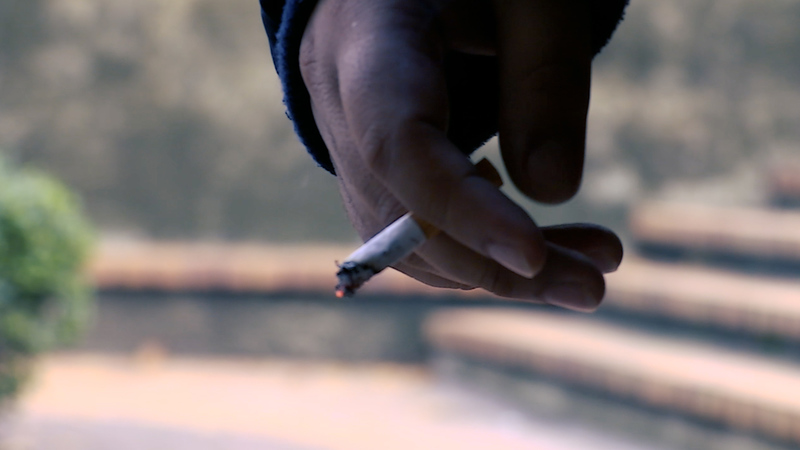UCT’s new smoking policy
26 June 2017 | Story Chido Mbambe. Photo and Video Saadiq Behardien.
The University of Cape Town (UCT) aims to provide a safe and healthy working and learning environment for students, faculty, staff and visitors to its campuses, and will be implementing a revised smoking policy to ensure this.
The new smoking policy was announced in March, three months prior to its implementation, to give smokers time to adapt to its restrictions and to facilitate a smooth transition to the new university environment.
The smoking policy is applicable to all students, faculty, staff and vendors operating on university grounds; visiting workers, contractors, sub-contractors and their employees; and other parties such as visitors, regardless of the purpose of their visit.
“We’ve had a [smoking] policy since 2014 and the legislation for tobacco control was promulgated in the ’90s already, so we should have had a policy a lot earlier. The policy has been tightened up and reviewed and there’s a clearer intent to implement and enforce it at this point in time,” says occupational medicine specialist Dr Shahieda Adams.
The new smoking policy is based on legislative and regulatory frameworks drawn from the Tobacco Products Control Act, 1993 (Act 83 of 1993), Tobacco Products Control Amendment Act, 1999 (Act 12 of 1999), Occupational Health and Safety Act, 1993 (Act 85 of 1993) and the Constitution of the Republic of South Africa, Section 24.
“In terms of the Constitution, people have the right to a safe and healthy environment, while the Occupational Health and Safety Act requires that the employer provides its employees with a healthy and safe working environment. Then, in terms of the tobacco control legislation, it effectively mandates public institutions and employers to have a smoking policy in place to protect the rights of non-smokers specifically,” says Adams.
Hot spots and smoke-free zones
The policy applies to all UCT facilities and vehicles, owned or leased, regardless of location.
Smoking is not permitted in any enclosed place, including private residential space within UCT housing.
Smoking is also prohibited in service areas and service lines on balconies, verandas, covered walkways, and in parking areas and links to other buildings.
All areas, whether enclosed or not, where food and beverages are prepared, purchased or consumed, and within five metres of these areas, will now be non-smoking zones.
Some other hot spots on campus where you will no longer be able to smoke include, but are not limited to, Cissie Gool Plaza, the Health Sciences quad, the quad between Kramer and All Africa House, University Avenue between Molecular and Cell Biology and the NSLT block, and the area between Leslie Social Sciences and the Geological Sciences buildings.
Smoking is banned within a 10-metre radius of any entrance or exit to buildings, air-conditioning intakes, or operable windows.
The Physical Planning Unit will ensure that there are visible no-smoking signs posted at all points of entry to the campuses and at all building entrances, as well as demarcating which areas are restricted and how far the zones extend.
In line with the university’s desire to promote a healthier working environment, UCT has chosen not to promote smoking and has opted not to allocate designated smoking rooms or areas inside the restricted areas. No ashtrays will be provided at any location on campus where smoking is prohibited.
The selling or distribution of smoking related products on campus, which includes e-cigarettes, cigars and pipes, including hookah pipes, is also prohibited.
Violations of the policy will be treated in accordance with general campus disciplinary procedures.
Masking the dangers
The policy will also strictly apply to smoking related products such as e-cigarettes and hookah pipes.
“Vaping is an alternative way of delivering nicotine – it’s in a liquid form and gets vaporised instead of burnt like a cigarette, but the toxins are very similar to those contained in cigarettes. It has carcinogens, which are cancer causing substances, and various toxins. It certainly has nicotine in it, although the amounts might be smaller – we think that it could potentially have the same harmful effects as smoking,” says Adams.
The research data isn’t there yet because it’s so new and sufficient studies have not yet been done, she adds. “There certainly is no evidence to suggest that vaping is safer than smoking.”
The effects of second-hand smoking have been well studied.
“It certainly leads to increases in cancer as well as premature deaths in both adults and children. There are well-known effects on children, particularly with regards to respiratory health, with studies showing increased rates of infection, asthma and allergy,” she says.
The university will review the policy every five years but hopes to encourage a healthier, more productive living and learning environment for all members of the campus community.
Familiarise yourself with the policy...
 This work is licensed under a Creative Commons Attribution-NoDerivatives 4.0 International License.
This work is licensed under a Creative Commons Attribution-NoDerivatives 4.0 International License.
Please view the republishing articles page for more information.










